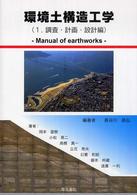- ホーム
- > 洋書
- > 英文書
- > Politics / International Relations
Full Description
In this pathbreaking book, Pierre Charbonnier opens up a new intellectual terrain: an environmental history of political ideas. His aim is not to locate the seeds of ecological thought in the history of political ideas as others have done, but rather to show that all political ideas, whether or not they endorse ecological ideals, are informed by a certain conception of our relationship to the Earth and to our environment.
The fundamental political categories of modernity were founded on the idea that we could improve on nature, that we could exert a decisive victory over its excesses and claim unlimited access to earthly resources. In this way, modern thinkers imagined a political society of free individuals, equal and prosperous, alongside the development of industry geared towards progress and liberated from the Earth's shackles. Yet this pact between democracy and growth has now been called into question by climate change and the environmental crisis. It is therefore our duty today to rethink political emancipation, bearing in mind that this can no longer draw on the prospect of infinite growth promised by industrial capitalism. Ecology must draw on the power harnessed by nineteenth-century socialism to respond to the massive impact of industrialization, but it must also rethink the imperative to offer protection to society by taking account of the solidarity of social groups and their conditions in a world transformed by climate change.
This timely and original work of social and political theory will be of interest to a wide readership in politics, sociology, environmental studies and the social sciences and humanities generally.
Contents
Acknowledgements
Foreword
Introduction
Chapter One. The critique of ecological reason
The fabric of liberty
The other history. Ecology and the labour question
Subsisting, dwelling, knowing
Autonomy and abundance
Chapter Two. Sovereignty and property. Political philosophy and the land
The political affordances of the land
Grotius: Empire and possession
Locke: the improving citizen
Chapter Three. Grain and the market. The order of commerce and the organic economy in the eighteenth century
The good use of the land
The agrarian kingdom of the Physiocrats
The liberal pact: Adam Smith
Two types of growth
Fichte: the ubiquity of the moderns
Chapter Four. The new ecological regime
From one liberalism to another
The paradoxes of autonomy: Guizot
The paradoxes of abundance: Jevons
Colonial extractions
Extraction-autonomy: Tocqueville
Chapter Five. Industrial democracy. From Proudhon to Durkheim
Revolutions and industry
Property and labour
Proudhon as critic of the liberal pact
The fraternal idiom
Durkheim: 'carbon sociology'
The political affordances of coal
Chapter Six. The technocratic hypothesis. Saint-Simon and Veblen
Material flows and market arrangements
The technological normativity of the moderns
Laying bare the productive schema
Veblen and the cult of efficiency
The engineer and property
Chapter Seven. Nature in a market society
Marx as a thinker of autonomy
Putting the forest to good use
Technology and agronomy
Conquering the globe
Karl Polanyi: protecting society, protecting nature
Disembedding
Socialism, liberalism, conservatism
Chapter Eight. The great acceleration and the eclipse of nature
Freedom from want
Emancipation and acceleration: Herbert Marcuse
Oil and atomic power: invisible energies
Chapter Nine. Risks and limits: the end of certainties
Alarms and controversies
The critique of development and political naturalism
Risk and the reinvention of autonomy
The impasse: between collapse and resilience
Chapter Ten. The end of the modern exception and political ecology
Symmetrizations
Authority and composition
Under naturalism lies production
Unequal ecological exchange
Provincializing critique
A new conceptual cartography
Changing expectations of justice
Autonomy without abundance
Towards a new critical subject
Chapter Eleven. The self-protection of the Earth.
Changing expectations of justice
Autonomy without abundance
Towards a new critical subject
Conclusion. Reinventing liberty
Notes
Bibliography
Index








